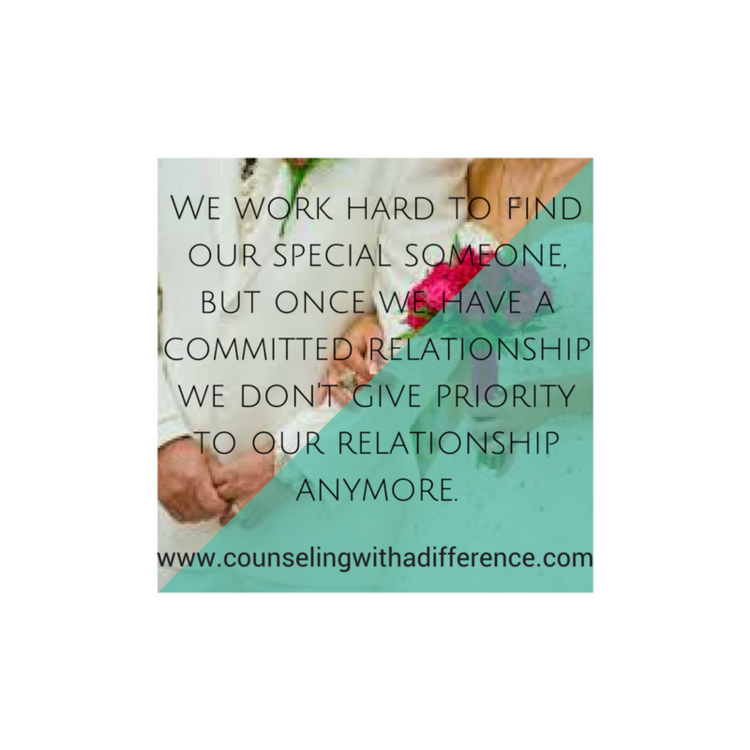Couples get into a relationship with the best of intentions. Unfortunately a lifetime of exposure to fairytale logic sets people up for an unrealistic impression of what real love is and what a committed relationship looks like.

When we don’t experience the automatic effortless love we were expecting, we get dissatisfied, disheartened, discouraged, and defeated. Instead of staying with it and trying to figure out how to get back to good we start giving up and losing hope.
We let work and kids get in the way of going all out in showing love to the one we got into all this for in the first place. If this is beginning to sound familiar, don’t despair there is definite hope.
According to Gottman, one of the biggest names in relationship research, almost 70% of conflicts in every relationship are ‘perpetual’, unsolvable. These conflicts occur as result of natural differences in personalities and lifestyle needs. The difference between couples who have a happy relationship and the ones who don’t is that the happy couples have figured out how to successfully negotiate these perpetual conflicts. They have figured out how to live with and love their partners in spite of their unsolvable issues.
Where this idea of all relationships having 70% of unsolvable perpetual conflicts sounds begins to sound like a verdict, it also gives hope and makes you realize:
1. You are not alone for hating the one you love at times. You are a normal couple if you are at your wit’s end when he leaves the toilet seat up once more, or if you want to just call it quits when the room looks like a tornado hit it after she is done getting ready for work.
2. Your relationship still has hope even though there are things about your partner you know you will never be able to get over.
Real Love VS Involuntary Love (aka. infatuation/crush):
You cannot take credit for what you did for someone in the early years of your relationship. The early love is involuntary in nature and lasts only about 2 years. If the couples are not able to grow and mature this early love into deep, real love, there is a great risk of falling apart (Gary Chapman).
Don’t freak out just yet.
All behavior is learned, thus it can be unlearned.
If you don’t like something, change it.

Real love is a choice. It is a willingness to do things for your beloved that are not easy for you. It is choosing to go against your comfort zone to accommodate your partner even if that’s not really your ‘thing’. It is knowing a person’s flaws and choosing to love them. It is not accidental, but when you love someone, difficult things become easy to do.
If you love your partner, work hard to learn to love them.
Tips On Learning to Have Intimate Conversations
1. Understand Before You Advise:
An intimate conversation has only one goal: To understand.
Not to solve.
Homework Exercise:
The next time your partner comes to you with a problem, turn towards him/her and listen carefully (no media at that time) and resist the urge to solve the problem, no matter how strong the urge.
If you are confused and feel you should be giving advice, get clarity by asking: “Do you want me to just hear you out or do you want help solving it?”.

If he/she asks for a solution then first repeat the issue your partner described to you in your words before you attempt to give a solution. Repeating gives you a chance to make sure you understand the problem properly. It gives your partner evidence that you have understood them. It becomes easier for your partner to accept the solution as valid and valuable when he/she feels you understood the problem before offering the solution. Finally, don’t take it personally if your partner doesn’t ultimately take your advice. The goal was not to be right, it was to make your partner feel like that he/she have your full attention and commitment when they have a problem. Don’t lose focus.
“People don’t always remember what you did for them, but they always remember how you made them feel.”
2. Allow Emotional Expression:
To allow intimacy in your conversations, be the special person whom your partner can untangle their feelings, thoughts, and emotions with. Here is how:
– Ask open-ended questions.
These sound like: “What do you think is the worse case scenario here?”, “What is holding you back?”, “What are your other options in this situation”? Often people develop tunnel vision because they are too close to their problem. Asking open-ended questions and receiving the answers in the ways described is a great service to offer your beloved. it gives them a venue to think without judgment, and a chance to analyze and assess the situation from different angels without pressure. You allow your partner to feel supported while giving them the dignity to ultimately arrive at the solution themselves.
– Don’t interrupt.
Give your beloved the space to be able to focus on their feelings when they are expressing themselves. A conversation where a person is able to use metaphors, images, and phrases to express their feelings and thoughts to someone has the ability to provide the calmness, completeness, and deescalation that is irreplaceable. This is the backbone of an intimate conversation. If your goal is to have an intimate conversation rather than be right, then don’t interrupt to make a point. Instead, make it a point not to interrupt.

– Listen close enough to be able to repeat in your own words.
A sign that you are not listening correctly is if you are thinking about a comeback or what you are feeling while your partner is talking instead of trying to understand your partner’s perspective.
– Don’t be judgmental just empathize and validate.
It sounds something like: “that must be so hard to deal with on a daily basis”, “I am so sorry you are going through that”.
Don’t say anything that starts with “At least”. Don’t say: “At least you are healthy and alive, there are people dying in some parts of the world”.
“Remember you goal is not to be right, it is to do the right thing by your relationship.”
This doesn’t mean you agree with your partner’s perception or memory, you might have a completely different take on the same incidence, it just means you are giving them the respect of accepting their thoughts and feelings and giving yourself the respect of keeping yours.
“Two people can have different perceptions of the same event that can both be valid.”

Read my blog next week for more tips.
If these tips don’t work for you, or if you have questions about them, feel free to contact Sanya Bari, LPC at sanya@sanyabari.com.
